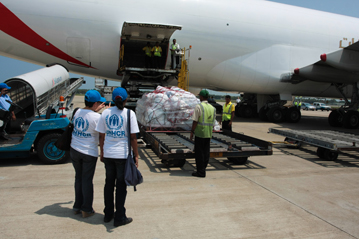Hundreds of Ivorians flee potential clashes for Liberia
Hundreds of Ivorians flee potential clashes for Liberia

SACLEPEA, Liberia, Nov 9 (UNHCR) - More than 1,300 Ivorians have fled into eastern Liberia as an 18-month ceasefire breaks down in Côte d'Ivoire, prompting the UN refugee agency and its partners to rush assistance to Liberia's border area.
To date, 1,327 refugees from Côte d'Ivoire have arrived in and around Butuo, a border town in Liberia's Nimba county. They say they are fleeing out of fear of potential clashes between the Ivorian government and rebel troops as a ceasefire agreement reached in May 2003 broke down last week. The local district authority in Butuo told UNHCR that he heard gunfire overnight during the weekend.
The majority of the new arrivals are women and children, with a few elderly people. They appear traumatised but are otherwise in good condition. The situation on Butuo is calm, with the Liberian government and local communities remaining open and receptive to the continuing influx. Many of the refugees are being hosted in three makeshift sites provided by the local authorities.
The Liberian National Red Cross Society (LNRCS) has been receiving and registering the new arrivals, as well as distributing emergency aid - blankets, lanterns, jerry cans, soap - provided by UNHCR. Non-governmental organisation Liberians United to Save Humanity (LUSH) has started rehabilitating a water pump and building latrines at the makeshift sites.
The International Committee of the Red Cross (ICRC) has been providing medical treatment, while Medical Emergency Relief Cooperative International (MERCI) will assess medical facilities in the affected area.
UNHCR has called for emergency supplies of food and relief items to ease the burden on the local community. There is also an urgent need for medical supplies.
The refugees are believed to be crossing into Liberia through 13 border points, some of which are not accessible due to heavy rains and poor road conditions. UNHCR and LNRCS are working with the local authorities and refugee leaders to track down the new arrivals in the border area in order to assess their needs and provide adequate assistance.
The refugee agency is also helping the local authorities to identify suitable locations to build a transit centre. UNHCR has an existing camp in the main Nimba town of Saclepea, about 80 km from Butuo, that already hosts several hundred Ivorian refugees and can accommodate a total of 1,500 people. But the agency cannot move the new arrivals there due to poor road conditions between the two towns.
The civil war in Côte d'Ivoire erupted in September 2002, but calmed down with the signing of the Marcoussis peace accords in May 2003. The fragile peace was broken again last Thursday when the Ivorian government launched an offensive in the rebel-held north.
There have been no reported arrivals of Liberian refugees from Côte d'Ivoire since the latest outbreak of violence. But UNHCR expects that if the situation deteriorates, many of the 70,000 Liberian refugees in Côte d'Ivoire - mostly in Tabou in the south - could head home on their own.
The only other place reporting an influx from Côte d'Ivoire since the weekend was Ghana, where 270 immigrant workers, mostly from Burkina Faso and Nigeria, arrived. They came by bus through the Ghana border crossing at Elubo. An inter-agency mission is attending to their needs. Several wounded Malians from Côte d'Ivoire were evacuated to Mali for medical treatment.









